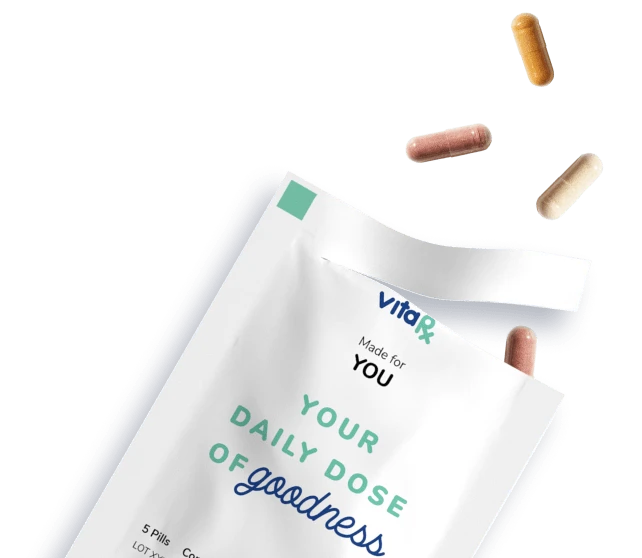Last update: January 20, 2025
6 minute read
The Health Benefits of Magnesium
Discover magnesium's vital role in health, from stress relief to better sleep. Learn about deficiency symptoms, supplements, and magnesium-rich foods.

By Derick Rodriguez, Associate Editor
Edited by Dr. Dimitar Marinov, MD, RDN, PhD

Have you ever wondered why people are raving about the benefits of Magnesium? Well, buckle up because you're about to dive into a world of the "magnificent" magnesium!
In this blog post, we'll explore the potential benefits of magnesium, like stress relief, better sleep, and improved muscle and heart health. You'll also learn about magnesium-rich foods. So, let's get started and unlock the secrets of this mighty mineral, shall we?
Key takeaways
- Magnesium is essential for hundreds of biochemical reactions in your body
- Increased magnesium intake may boost exercise performance, particularly in those deficient in this nutrient
- Magnesium supplementation may help reduce symptoms of depression
What is magnesium?
Magnesium is an essential mineral that is vital in many bodily functions. It is involved in more than 300 enzyme reactions, contributing to processes like muscle and nerve function, energy production, and supporting a healthy immune system. It's naturally found in many foods, and supplements are available to ensure adequate intake.

The benefits of taking magnesium
Here are just a few of the many health benefits you may experience from taking magnesium
1. Stress relief and anxiety reduction
Magnesium plays a vital role in stress management, as it helps regulate the nervous system and reduce cortisol levels. Research shows that an adequate magnesium intake may help lower anxiety and other stress-related symptoms.
One study found that supplementing with 300 mg of magnesium daily significantly reduced anxiety levels in participants after six weeks. Additionally, magnesium has been linked to increased brain levels of gamma-aminobutyric acid (GABA), a neurotransmitter that promotes relaxation and reduces anxiety.
So, don't stress out! Ensure you're getting enough magnesium to keep your nerves calm and collected.
2. Improved sleep quality
Having trouble catching some Z's? Magnesium might be the answer to your sleepless nights.
Magnesium improves sleep quality likely by regulating melatonin, which controls sleep-wake cycles. A study revealed that participants who received 500 mg of magnesium daily for eight weeks experienced significant improvements in sleep quality and duration.
Moreover, magnesium's ability to relax muscles and calm the nervous system also contributes to better sleep. So, next time you're struggling to doze off, consider adding magnesium-rich foods to your diet or trying a supplement.
3. Supports muscle health
Flex those muscles because magnesium is here to support them! This mighty mineral aids in muscle contraction and relaxation, helping to prevent muscle cramps and spasms.
Research indicates that a magnesium deficiency may lead to muscle weakness and even impair athletic performance. Magnesium also plays a role in energy production, as it's involved in the conversion of food into energy. So, don't skip magnesium if you want to power through your workouts and maintain strong, healthy muscles.
4. Heart health support
Show your heart some love by ensuring you're getting enough magnesium. This essential mineral is crucial for maintaining a healthy heart rhythm and blood pressure. Studies have found that higher magnesium intake is associated with a reduced risk of developing cardiovascular diseases.
Additionally, magnesium helps regulate the balance of other minerals like calcium and potassium, which are vital for proper heart function. So, keep your heart pumping strong with a magnesium-rich diet.
5. Bone health and strength
Did you know magnesium is a key player in bone health? Approximately 60% of the body's magnesium is stored in our bones. Being sufficient in magnesium helps with calcium absorption and plays a role in activating vitamin D, both of which are essential for strong bones
Research suggests that a higher magnesium intake is associated with greater bone density, reducing the risk of osteoporosis and fractures. Strengthen your bones and strut your stuff confidently by adding more magnesium to your daily routine.
How does magnesium work?
One of magnesium's most important functions is cellular energy production. Magnesium is found in the mitochondria—the cell's energy powerhouse—where it's needed for the metabolism of food into adenosine triphosphate (ATP) molecules.
As the body's main energy currency, ATP is required for optimal cell function, healthy energy levels, and better physical recovery. Conversely, if you're deficient or have lower magnesium levels, it can slow physical recovery.
Magnesium is also a vital mineral for muscle function and nerve transmission. It acts as a calcium blocker in muscle cells, regulating the process of muscle contraction and relaxation.
Additionally, the mineral density from magnesium therapy balances neurotransmitters that allow nerve impulses to move smoothly between the synapses in your nervous system.
This balance might be unstable if you have magnesium depletion, making it harder for nerve impulses to move around. You can improve your magnesium levels by ensuring adequate dietary intake via food or supplements.
Top magnesium-rich foods to boost your intake
As an essential nutrient, magnesium needs to be consumed daily. Some of the best dietary sources include fish, green leafy vegetables, legumes, whole grains, nuts, and seeds.
The table below presents a list of excellent sources of magnesium in food. These nutrient-dense options can help you meet your daily magnesium needs and enjoy this essential mineral's many health benefits. Adding these foods to your diet will help you maintain optimal magnesium levels and support your overall well-being.
Food | Magnesium (mg) per 100g | % Daily Value (DV) |
|---|---|---|
Pumpkin seeds | 592 | 141% |
Almonds | 270 | 64% |
Spinach (cooked) | 87 | 21% |
Black beans (cooked) | 70 | 17% |
Quinoa (cooked) | 64 | 15% |
Dark chocolate (70-85%) | 228 | 54% |
Avocado | 29 | 7% |
Salmon (cooked) | 27 | 6% |
Banana | 27 | 6% |
Whole wheat bread | 22 | 5% |
Caption: A list of magnesium-rich foods and their magnesium content per 100g. Source: U.S. Department of Agriculture, Agricultural Research Service. FoodData Central, 2021. fdc.nal.usda.gov.
Frequently asked questions (FAQ)
Final thoughts
Now that you're more informed about the magnificent benefits of magnesium, you might feel like a "magnesi-whiz"! Remember, including magnesium-rich foods in your diet and considering supplements when needed can support your overall health and well-being.
Sources
- The effect of magnesium supplementation on primary insomnia in elderly: A double-blind placebo-controlled clinical trial
- Update on the relationship between magnesium and exercise
- Circulating and dietary magnesium and risk of cardiovascular disease: a systematic review and meta-analysis of prospective studies
- Magnesium - StatPearls - NCBI Bookshelf
- Superiority of magnesium and vitamin B6 over magnesium alone on severe stress in healthy adults with low magnesemia: A randomized, single-blind clinical trial | PLOS ONE
Editor

Derick Rodriguez
Derick Rodriguez focuses on editing health and wellness-related content. With over half a decade of experience in the digital realm, Derick has developed a unique skill set that bridges the gap between complex health concepts and accessible, user-friendly communication. His approach is deeply rooted in leveraging personal experiences and insights to illuminate the nuances of health and wellness topics, making them more approachable and empowering readers with knowledge and confidence.
Fact checker

Dr. Dimitar Marinov
Dr. Marinov has years of experience in scientific research and preventive and clinical medicine. His publications in peer-reviewed journals are on nutritional status, physical activity, and musculoskeletal disorders among adolescents.
At VitaRx, we're not just passionate about our work — we take immense pride in it. Our dedicated team of writers diligently follows strict editorial standards, ensuring that every piece of content we publish is accurate, current, and highly valuable. We don't just strive for quality; we aim for excellence.
Related posts
While you're at it, here are some other relevant articles you might be interested in.

Get your personalized vitamin recommendations in less than
5 minutes.
Get your personalized vitamin recommendations in less than
5 minutes.







